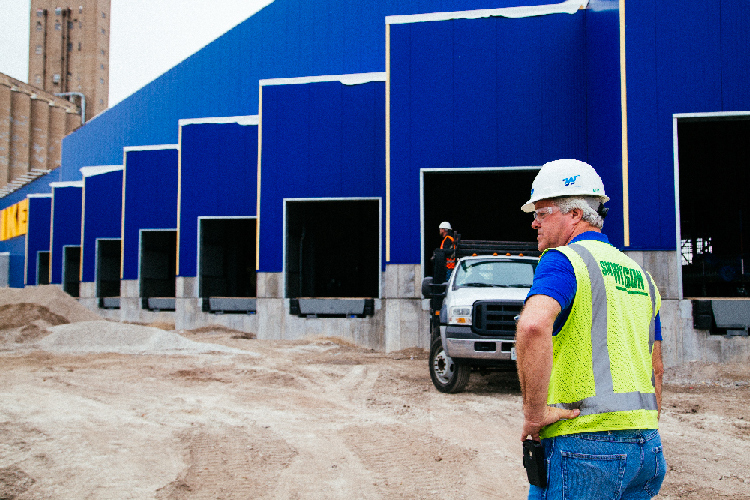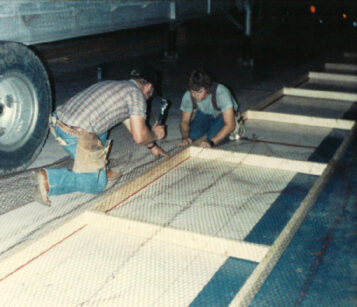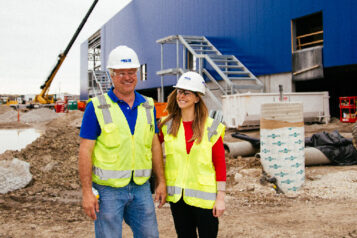
Lunch time, the versality of tape measures & standing by your decisions
By Chris Maday Schmidt
Steve Williams is a second-generation S. M. Wilson & Co. superintendent who began his career working for his father, Larry Williams (44-year Wilson lead superintendent). With 42 years of construction experience, he’s worked in different superintendent capacities, with project superintendent as his most recent position. Williams is well-organized with the ability to plan far in advance of execution. As a result of his excellent planning and coordinating capabilities, he’s been assigned several out-of-town standalone projects. Join Construction Superintendent as Williams shares lessons learned from his dad, the ins and outs of life as a traveling superintendent and much more.
(Q) Talk a little about what it was like to work for your dad as a second-generation superintendent.
To this day, I consider my dad my mentor and best working buddy. I can truly say there was no one I would rather work alongside. My father got me a laborer’s card so I could work during the summer of my high school junior and senior years. After graduating in 1979, I took some time to myself and then started working for S. M. Wilson full time in1981 shortly after getting married. Until I became a full-time superintendent, we worked side by side whenever we could.

(Q) What lessons or takeaways did you learn from working alongside your dad for all those years? What do you remember most about working alongside your dad? Are there lessons you learned, from your dad, that you tend to naturally teach new staffers that you meet in the field?
Working alongside my father for so many years, he passed down so many lessons. Here are the ones I remember most.
Always try to get as much info as you can so you can make the best decision possible in any given situation. Think it through. If you’re looking far enough ahead, you should have time to have the conversations to help in that process. I’ve always said a good superintendent sees just a little further down the road than most of the others on the job.
Always stand by your decision, good or bad. Hopefully you end up making more good than bad, but when you do make a bad one, stand behind it, don’t crawfish and change your story. If you lose the respect from the guys on the job, you’ll fight it all the way through the job.
Know your job. When you can discuss the details of your job from memory with your subcontractors, they figure out real quick that this guy is on his game.
Remember that your subcontractors are part of the team. You get respect when you give respect. I tell my guys that I am 100% confident that we can handle any problem/question that comes up along the way. If we can’t, I’ll call someone who can.
The more I think about it, it seems like I could fill a book with stories and life lessons that I have learned.
(Q) Walk us through your steps to planning and coordinating.
After more than 40 years in construction, the right order of doing things, when it comes to the planning and coordination, becomes second nature. When you learn how to do things the right way early on, so much of it is common sense. With much of my career spent in retail, I became very accustomed to working backwards in the planning and coordination in order to ensure that we met the client’s end-date goal. We would make sure we understood their goal date to have the doors open to the public, and then we would plan backwards accordingly to set deadlines for construction and ordering materials. This is very similar with any type of project in any market. There is no doubt about it; there is an art to scheduling, but after a while, it comes naturally.
(Q) Share a bit about the out-of-town standalone projects you’ve been assigned and what they entail.
For most of my career, I have worked as a traveling superintendent. When I was young, my father was also a traveling superintendent, which meant that our family would move from job to job every couple years. When I was older, my parents settled down in Mt. Vernon, Illinois. I understood the job — all the pros and cons — when I took the position, which led to several years of my wife and I moving around with the projects. After going from job to job as a traveling superintendent, my wife and I also chose to settle in Mt. Vernon to raise our family. I continued to travel from job to job with S. M. Wilson even after the move. Throughout my career, I have traveled from border to border and mountain range to mountain range across the United States from Syracuse, New York to Breckenridge, Colorado, throughout Texas and Louisiana into Michigan and Minnesota.
(Q) Your background includes a diverse range of projects, from education to food services, to department and retail stores, to a fire district. Which of these projects stands out as the most memorable? Why?
Having 40-45 years of experience at this point in my career as either a superintendent, or other positions I have served with S. M. Wilson, it is difficult to narrow down just one project that stands out the most.
Around 2000, Wilson was chosen to complete the Old Towne Plaza development in Ballwin, Missouri. This was a massive development with several different pieces — sitework, fill work, demolition work, the movement of a more than 100 year-old historic schoolhouse and then construction of numerous commercial businesses.
Most of my jobs had either been my dad and myself, or just me. This job stands out because it was the first job where there were so many S. M. Wilson people on one job. As funny as it sounds, lunch was always a huge deal. People would start calling around 10:30 a.m. to start asking about lunch and getting it lined up. There were times when there were up to eight people going to lunch. It was fun to have so many people out on one site, working together, fighting the good fight, all a part of the same family.
(Q) What has been your biggest challenge on the job over the course of your tenure? How did you work through it?
Funny enough it wasn’t “on” the job. It “was” the job. More specifically, traveling for the job. Traveling for work is definitely not for everyone. It can be hard on the person traveling and hard on the ones you leave behind. Unfortunately you find out, sometimes too late, you can’t get that time back. Once the PTA meetings, school plays and the ball games are over and the kids are grown, you don’t get those years back. I can’t say that I ever did “work through it.” You get enjoyment and learn to have fun where and when you can and keep going down the road to the next job.
(Q) What advice would you offer someone interested in pursuing a career in the construction industry?
Over the years, I have been asked this question a lot by young people interested in becoming a superintendent. I typically talk to them about the life of a traveling superintendent. Every person has to decide what path they choose to take and what’s best for them and their family.
I do have some advice for today’s high school graduates thinking about getting into the trades, though. Don’t walk out of school, thinking that you already know everything there is to know about everything. I would suggest, in the beginning, listening more than speaking. Be a sponge and soak up as much knowledge as you can from the people who have been in this industry for decades. Also give your employer a fair day’s work for a fair day’s pay. If you are putting in your time and showing some initiative along the way, an employer is going to keep you around and eventually reward you for your actions. If not, find a different employer; someone will appreciate your hard work. This is something that I learned to do from my dad and other people at S. M. Wilson over the years.
(Q) Which tool would you be lost without?
After putting a lot of thought into this question, I narrowed it down to two things — one thing today, and the other when I was first starting out.
Today, I would be utterly lost without my phone as a superintendent. You have so many conversations in a day with subcontractors, the project managers, the foremen, engineers, as well as people at other jobs looking for advice on a project and even sometimes I’m calling them for advice on my current job. In the current business atmosphere, you cannot do your job without a phone, as much as that pains me to say. Let’s face it, most phones today are practically mini computers that can do nearly everything for us.
Second on the list is my tape measure, especially in the beginning of my career. That tool can be used for so many different things, not only for measuring things. I use it for reaching things in high places, grabbing things across the table, propping something open, just to name a few. I am constantly using my tape measure for something. To this day, I have two items hanging on my sides, a cell phone and tape measure.
(Q) How has S.M. Wilson & Co. dealt with the labor and/or materials shortage over the past couple of years?
The world has never really made it back completely from the effects of COVID. It continues to be tough. As a team, all of us have to make sure we’re all on the same page and working with the same mindset. This has led to pre-planning projects differently and allowing for soft deadlines and extended timelines when it comes to materials you know are taking longer than usual. There is a whole list of considerations that our operations teams address with supply and demand. For instance, we know an emergency generator will take about 40-45 weeks to get; the main switch gear can take over a year; and the power company often has to order the transformer because they no longer keep them readily available in the yard anymore.
We have fought our way through the last two to three years with the longer timelines for materials and sometimes have had to push end dates for projects. Across the country, construction sites are seeing these shortages and everyone is experiencing these same problems. Everyone is of the same mindset because it’s happening everywhere.

(Q) When you hang up your hardhat at the end of the day, how do you like to spend your time?
I’ve never been much of a hunter or a fisherman. I grew up on dirt bikes, mini bikes and motorcycles, so did my wife. Over the years though, since I would only be home for 2 ½ days at a time, every other weekend, most of my time was spent getting things finished around the house and getting things ready to go back to the jobsite. Now as my life has begun to slow down, I have grown to love my relaxation time and am enjoying the peace and quiet, except when my grandsons are there. Nothing is quiet then.
(Q) Share a little-known tidbit about yourself or an on-the-job experience with Construction Superintendent readers.
At the end of my junior year of high school, my father got me a laborer’s card so I could work with S. M. Wilson at the Effingham Elementary job. At 16, this was my first construction job and my first time stepping foot into this industry as a worker. That morning, the crew was pouring a concrete deck pour. There was a small plywood ramp, on both sides of the 2×4 bulkhead, that each of us had to walk up and over, with a loaded Georgia Buggy, to dump the concrete. Feeling courageous, I grabbed the two-wheeled buggy, started pushing it up the ramp and down the other side, and then accidentally spilled concrete at the end of the ramp. The pour continued but me and the other laborers on the job had to trudge through my spilled concrete time and time again.
I can easily say that was the first and last time I ever spilled a Georgia Buggy of concrete. Here I am 45 years later and I will never forget the embarrassment of those first 10 or 15 minutes. I’m sure my father hasn’t either.
I have so many other stories that I could tell from my 45 years in the industry and with S. M. Wilson. It has been a great experience.



 Join our thriving community of 70,000+ superintendents and trade professionals on LinkedIn!
Join our thriving community of 70,000+ superintendents and trade professionals on LinkedIn! Search our job board for your next opportunity, or post an opening within your company.
Search our job board for your next opportunity, or post an opening within your company. Subscribe to our monthly
Construction Superintendent eNewsletter and stay current.
Subscribe to our monthly
Construction Superintendent eNewsletter and stay current.